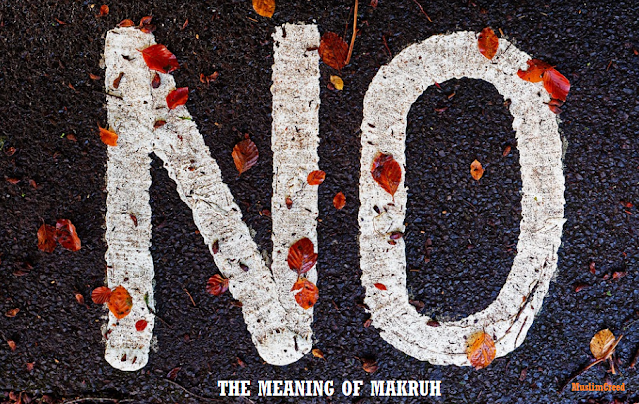The Meaning of Makruh
The meaning of makruh needs to be understood by every Muslim. This is related to something that can and cannot be done, as well as actions that are liked or hated by Allah SWT. The meaning of makruh, permissible, obligatory, sunnah, and haram of course you need to understand.
In addition to the well-known meanings of obligatory, sunnah, and haram, makruh and permissible still confuse many people. Therefore, the law that has an impact on whether or not you can do this act needs to be understood.
The meaning of makruh is something that if you do it you will not get a sin, but if you leave it you will get a reward. Activities with the legal status of makruh are prohibited, but there are no consequences for doing so.
Before knowing the meaning of makruh, you need to know the division of law in Islam first. Law means norms or rules, namely measures, benchmarks, benchmarks, guidelines used to assess human behavior or actions.
In Islamic law, there are five laws or rules that are used as a benchmark for measuring human actions both in the field of worship and in the way of life.
The five types of rules are al-ahkam al-khamsah or the classification of five or five qualifications, namely;
1. Mandatory (mandatory, fardh).
This Islamic law is divided into individual obligations (fardh’ain) such as prayer and fasting, and collective obligations (fardh kifayah) or the fulfillment of these obligations by a number of individuals freeing other individuals to carry out, such as funeral prayers and jihad.
2. Forbidden (haram)
When you do something that is forbidden by Allah SWT it will get a sin and if you leave the prohibition, then Allah SWT will give you a reward.
3. Permissible (mubah, jaiz, ibahah).
4. It is recommended (sunnah, mandub, mustahab).
5. Disliked (makruh).
The meaning of makruh in language is mubghod or hated. The meaning of karuh is a law that encourages you not to do an action. The meaning of makruh is if you don’t do the deed, you will get a reward, while if you do it, you will not sin.
The meaning of makruh is an act that is felt if leaving it is better than doing it. Examples of this makruh act include gargling and putting water into the nose excessively when going to perform ablution during the day during Ramadan, because it is feared that water will enter the throat cavity and be swallowed.
Apart from that, other makruh acts include eating onions (because of the smell), smoking, and various actions that may disturb other people.
The meaning of makruh is also often confused with permissible, even though the meanings of the two are different. Mubah is the law that is most neutral in nature. Mubah is neutral because this law can be carried out and may be abandoned. If you do it you will get a reward, while if you leave it you will not get a sin. According to scholars, permissible law is an act that tends to be recommended, but there is no guarantee of reward.
Makruh Type
After understanding the meaning of makruh, you also need to recognize its types. There are two types of makruh, namely makruh tahrim and makruh tanzih.
1. Makruh Tahrim
Makruh tahrim is something that is strictly prohibited by the Shari’a. Makruh tahrim is a demand to leave an action for sure but the arguments that show it are zhanni. Makruh tahrim is the opposite of obligatory as well as the opposite of fardhu among the majority of scholars. For example, the prohibition of wearing gold jewelry for men.
Another example, the absolute sunnah prayer, namely the sunnah prayer or prayer without a specific reason after the Fajr prayer or the Asr prayer. This falls into the category of makruh tahrim as narrated by Imam Muslim. This view is also held by the Shafi’i School.
2. Makruh Tanzih
Meanwhile, makruh tanzih is something that is recommended by the Shari’a to leave it, but the prohibition is not certain. Makruh tanzih is the opposite of the law of mandub. For example, eating horse meat during war. Other examples are drinking while standing, fanning hot food, starting something left-handed, and abandoning recommended practices.
Difference between Makruh Tahrim and Makruh Tanzih
People who violate the prohibition of makruh tahrim are threatened with sin, while those who violate the prohibition of makruh tanzih are not threatened with sin.
In addition, makruh tahrim is also often equated with haram. The difference between makruh tahrim and haram lies in the character of the source of the argument. If the prohibition of an act comes from the argument that allows takwil, then the forbidden thing is included in makruh tahrim. However, when the prohibition of an action comes from a qath’i argument that cannot be interpreted, then the forbidden thing is considered haram.
